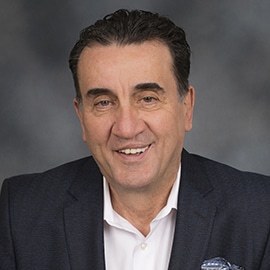
Endometriosis, often referred to as “endo” for short, is a condition that occurs when the inside lining of a woman’s uterus, called the endometrium, grows where it is not supposed to be. Most often, it is found on the organs right next to the uterus, like the ovaries, bladder and intestines. Sometimes, it can invade deep into these organs. Endometriosis causes local inflammation, which is very irritating to these organs and causes scar tissue as a reaction.
One in 10 reproductive-aged women have endometriosis in the United States. This condition affects more than 176 million women globally with no known cause. Endometriosis is often overlooked, and women often see an alarming average of four doctors and require up to 10 years before a correct diagnosis is made. There is currently no cure, but there are tools for managing the condition. Research is being done all over the world, including at the University of Louisville, to learn more about endometriosis and how to help patients live complete lives with a good quality of life.
Varying symptoms can occur for this condition and often start early right after puberty. Symptoms are not the same for every patient. They include:
- Painful periods, especially with missed work or school days
- Pain during and after sex, that can last hours
- Irregular and heavy periods
- Digestive problems, such as painful bowel movements, diarrhea or constipation, all worse during the period
- Ovarian cysts
- Infertility
- Excessive bloating, also known as “endo belly”
Endometriosis is most often diagnosed by a gynecologist. Currently, there are few endometriosis experts around the world that have done specialized training to care for patients with endometriosis. A physical examination and review of the patient’s medical history is commonly done first. Additional tests that may be ordered in order to assist in the diagnosis of the condition are:
- Ultrasound: A diagnostic imaging technique that uses high-frequency sound waves to create an image of the organs.
- MRI scan: A noninvasive procedure that produces a two-dimensional view of an internal organ or structure. This is especially important for deep endometriosis lesions.
- Laparoscopy: An outpatient surgery in which a doctor looks in the abdomen with a camera through the belly button, to visualize and excise suspected endometriosis implants. This is currently the only way to know for sure if a patient has endometriosis or not. A complete excision surgery the first time is crucial to get optimal pain relief and may be all you need in order to improve your fertility.
Endometriosis is very challenging for women who experience it for many reasons. Those who do not have endometriosis often don’t understand or believe the severity of the condition. Patients may find themselves advocating for themselves in many settings, including in the doctor’s office. Early diagnosis is key. Working with an expert endometriosis surgeon who has dedicated a significant portion of his/her career to learning about endometriosis, helps patients live a fulfilling life in spite of endometriosis.
Do you think you might have endometriosis or just haven’t been to a gynecologist in a while? Our minimally invasive gynecologic surgeons at UofL Physicians – OB/GYN & Women’s Health specialize in endometriosis and can help you develop a personalized management plan that works for you. To schedule an appointment with UofL Physicians – OB/GYN & Women’s Health, call 502-588-4400 and schedule a visit with our team.









